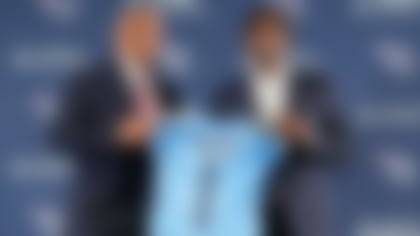Dan Campbell's fourth-down decisions fueled the media's talking points Monday, after the Detroit Lions fumbled a chance to play in their first Super Bowl with a 34-31 loss to the San Francisco 49ers.
Dissecting Campbell's decisions to eschew two field-foal attempts for fourth-down tries is fair, but the coach has always leaned aggressive in those situations. It's part of his makeup and the club's at this point. The mentality helped the Lions reach the NFC Championship Game just two years after a three-win season.
Regardless of what you think of the fourth-down calls, the biggest coaching blunder on Sunday night occurred with the Lions trailing by 10 points on third-and-goal from the 1-yard line. Detroit called a David Montgomery run, which was stuffed for a 2-yard loss. Campbell then called the Lions' first timeout. Jameson Williams scored on the next play, but the back-to-back poor decisions put the Lions in a spot where they needed to recover an onside kick -- an extremely low-percentage play -- for a shot to tie the game.
On Monday, Campbell admitted he probably shouldn't have run the ball in that situation.
"The easy thing to do is to throw it," Campbell said during . "Probably should've been the right thing, but for me, I wanted to run it. I thought we would just pop it. We had just -- 2-minute all the way down the field, throwing the football and they were in a four-down front and I believed we'd walk right in, and we just missed a block. So then, yeah, I've got to use a timeout. So, hindsight, throw it four times. But I believed in that moment it was going to be a walk-in run. And it didn't work out. So, I gambled and lost."
First, yes, he should have passed the ball on third down. It's fair to think how a run at that juncture might've surprised the Niners -- and maybe Montgomery gets in if Williams makes a better block -- but the risk wasn't worth getting stuffed. If the Lions were going to run it during that sequence, they should have done so on fourth down.
Second, the Lions didn't have to use a timeout after they were stopped. Keeping the timeout was more valuable in that exact moment than using it stop the clock. A fourth-down call should have been communicated in conjunction with the third-down run play. Campbell should have had his players ready to jump on the snap if the run was stuffed.
Even if, say, conservatively, 20 seconds comes off the clock, having three timeouts and 40 seconds left is better than 56 seconds with two timeouts. At least there still would have been a shot for the Lions to get the ball back, if they'd saved the timeout. Yes, a comeback down three, with less than one minute to play and zero timeouts, is unlikely. But that scenario is still better than one that requires recovering an onside kick.
The goal-line sequence occurred after the Lions had already squandered a 24-7 halftime lead, so it will get less attention, but from a pure decision-making standpoint, it was the most clear-cut coaching mistake of the night for Campbell.
"This is what you hear about all the time with catastrophes," Campbell said. "It doesn't take one or two, it takes 12 things to go wrong, and we did all 12 of those wrong in all three phases."












